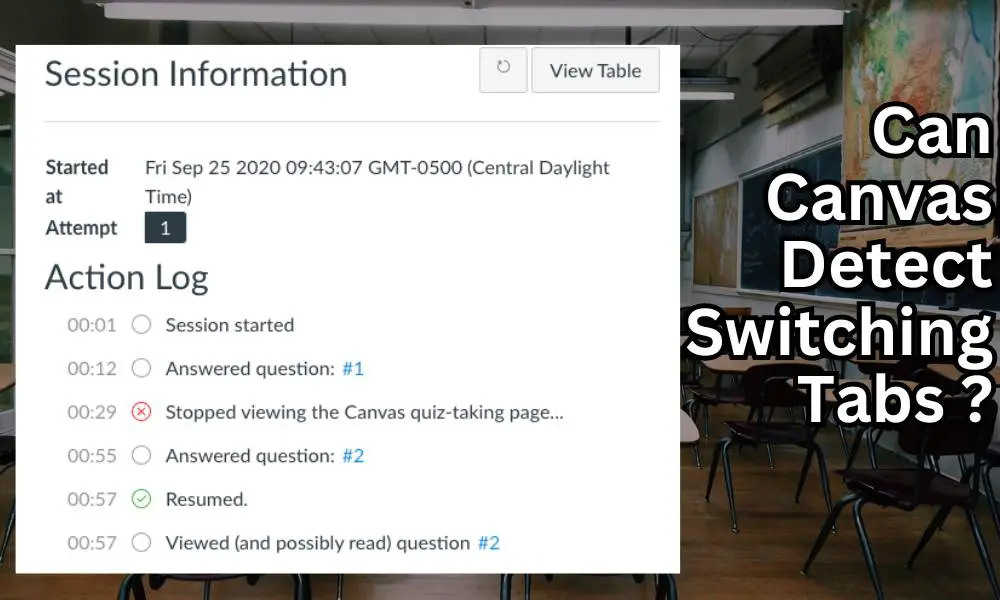Have you ever wondered if Canvas can keep an eye on you while you’re taking a test? Well, it’s not quite like having a superpower.
Canvas can also track where you end the quiz and go within the site, but this information is private. Some instructors may have access to monitoring features that can flag suspicious behavior.
However, it’s important to remember that these tools aren’t foolproof, and some students may try to find ways around them.

Can Canvas Detect Switching Tabs
Canvas can’t directly detect if you switch tabs during a test. This means that if you open a new tab or navigate away from the quiz page, Canvas won’t know about it.
However, Canvas does have some limitations in tracking your activity. While it can’t detect tab-switching, it can keep track of where you finish the quiz and go to another page within the Canvas site. But this information isn’t public.
To prevent students from using external resources or switching to other tabs, instructors can set restrictions within Canvas quizzes using features like ‘LockDown Browser’ or ‘Respondus Monitor’. These tools enhance test security, but they aren’t foolproof, and some students may try to find ways around them.
It’s always best to follow your instructor’s guidelines and check the course syllabus for specific testing procedures and restrictions.
Can Canvas tracks you
During a test, Canvas can track your activity on the site but can’t detect if you switch tabs or navigate away from the quiz page. However, it can track where you finish your quiz and if you visit another page within Canvas. This information isn’t available to the public.
These tools and features help enhance test security, but they aren’t foolproof, and some students may try to find ways around them.
Can Canvas Detect Screen Sharing?
Yes, Canvas can detect screen sharing during a test.
While Canvas doesn’t have a direct way to detect screen sharing, some instructors may have access to monitoring features that can identify suspicious activity. This includes situations where a student shares their screen with another device or person.
Additionally, certain institutions may use online proctoring services alongside Canvas, which use advanced technology to detect screen sharing through webcam monitoring and AI-driven behavior analysis.
Can Canvas Detect Screenshots?
No, Canvas can’t detect if you take screenshots during a test. Unlike some online proctoring services that use advanced technology to identify cheating attempts, Canvas doesn’t have the capability to monitor your screen for screenshots.
So, if you decide to take a screenshot while taking a test, Canvas won’t be able to detect it.
However, it’s important to remember that while Canvas may not catch screenshots, other measures might be in place to prevent cheating, like time limits, browser restrictions, or proctoring services.
Can Canvas Detect Split Screen?
Let’s explore whether Canvas can detect split screen usage during a test. While Canvas itself can’t directly detect if students open new tabs in a web browser, it does have some features and limitations to consider.
Canvas can track a student’s activity within the platform, including where they end a quiz and whether they visit other pages within Canvas. However, this information isn’t publicly available.
Some institutions may also use online proctoring services alongside Canvas. These services employ features like webcam monitoring and AI-driven behavior analysis to detect cheating attempts. While these tools and features enhance test security, it’s important to note that they aren’t foolproof, and students may still try to find ways to bypass them.
Can Canvas Detect Copy Paste
When you’re taking a test on Canvas, you might wonder if the platform can detect if you copy and paste. The truth is, Canvas itself doesn’t directly detect copy-paste actions.
However, your instructors can set restrictions within Canvas quizzes using features like ‘LockDown Browser’ or ‘Respondus Monitor’ to prevent you from copying and pasting from external sources.
Can Canvas Detect Phone Activity?
While Canvas itself can’t directly detect phone activity during a test, your instructors may have access to monitoring features or online proctoring services that can help identify any suspicious behavior.
These tools and services are designed to track your actions, like if you navigate away from the quiz page or try to open a new browser tab. Some institutions even use online proctoring services that utilize webcam monitoring, screen sharing, and AI-driven behavior analysis to catch cheating attempts.
However, it’s important to keep in mind that these measures aren’t foolproof, and some students may still try to find ways around them.
The use of monitoring features and proctoring services may vary among instructors and institutions, so it’s a good idea to consult your instructors or review the course syllabus for specific testing procedures and any restrictions on phone use during exams.
What Can Professors See On Canvas During Quizzes
During quizzes on Canvas, professors can gather various information to assess your performance. Here are three things they can see:
- Quiz submissions: Professors can track when you started and submitted the quiz, as well as how long it took you to complete it. This helps them understand your timing and performance.
- Question responses: Professors have access to the answers you provided for each question. This allows them to evaluate your understanding of the material and offer feedback accordingly.
- Attempts and scores: If multiple quiz attempts are allowed, professors can see all your previous tries along with the scores you received. This helps them track your progress and measure your improvement over time.
Also Read: Learn How To Write Email To Teacher For Submit Assignment
Conclusion
So, does Canvas know when you switch to a different tab during a test?
Well, the answer isn’t a simple yes or no. Canvas does have features in place to address this concern, such as restrictions and monitoring tools that instructors can use. However, it’s important to note that these measures aren’t foolproof. Some students may still try to find ways around them.
To ensure you stay on the right side of the rules, it’s crucial to be aware of the policies set by your instructors and to reach out to them if you have any concerns or questions. Keep in mind that the effectiveness of Canvas in detecting tab-switching or other activities during a test can vary.
So, it’s always best to stay focused and give your full attention to the task at hand.

